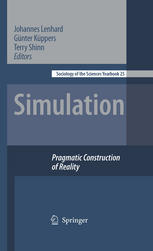

Most ebook files are in PDF format, so you can easily read them using various software such as Foxit Reader or directly on the Google Chrome browser.
Some ebook files are released by publishers in other formats such as .awz, .mobi, .epub, .fb2, etc. You may need to install specific software to read these formats on mobile/PC, such as Calibre.
Please read the tutorial at this link: https://ebookbell.com/faq
We offer FREE conversion to the popular formats you request; however, this may take some time. Therefore, right after payment, please email us, and we will try to provide the service as quickly as possible.
For some exceptional file formats or broken links (if any), please refrain from opening any disputes. Instead, email us first, and we will try to assist within a maximum of 6 hours.
EbookBell Team

5.0
18 reviewsThis book examines the historical roots and evolution of simulation from an epistemological, institutional and technical perspective. Rich case studies go far beyond documentation of simulation’s capacity for application in many domains, they also explore the "functional" and "structural" debate that continues to traverse simulation thought and action. One here asks if simulation deeply transforms science, or instead constitutes a limited tool that principally extends the repertory of erstwhile practice. Does simulation comprise a novel form of experiment, or rather operate as a mechanism which extends standing forms of experimentation? What are simulation’s relations with models or theory, for example? These studies further query to what extent and in what ways simulation may be regarded as a discipline, a special species of instrument, or as transdisciplinary.